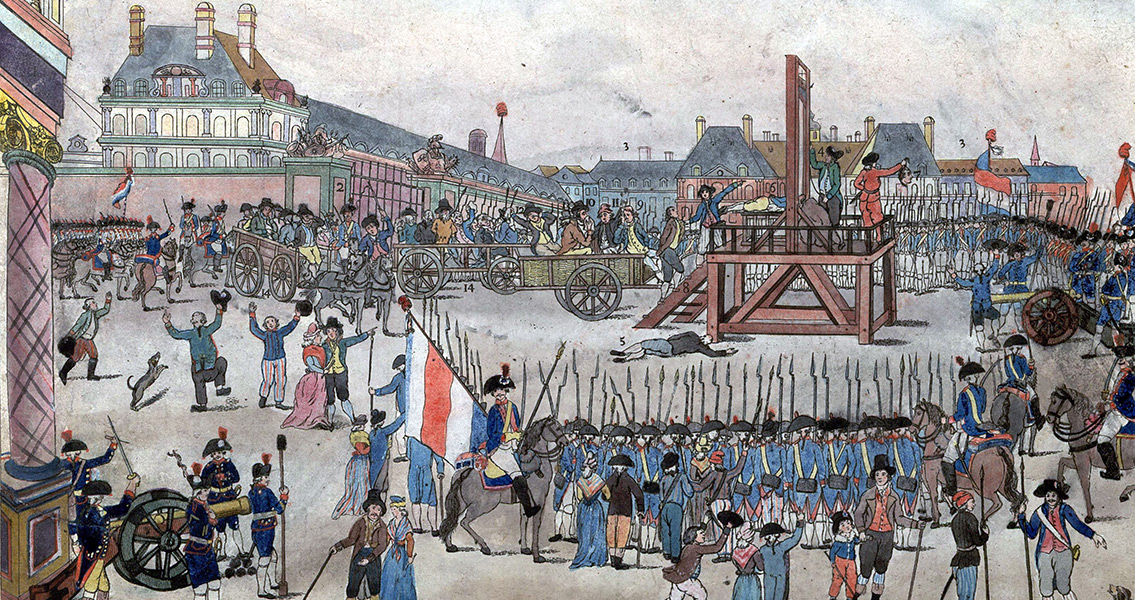<![CDATA[On 27th July, 1794, the Reign of Terror in France came to an end with the overthrow and arrest of Maximilien Marie Isidore de Robespierre. Following their arrest by the French National Assembly, Robespierre and his allies were taken to the Luxembourg Prison in Paris. The prison warden refused to jail Robespierre, and he was able to escape to the Hotel de Ville. Armed supporters arrived to protect Robespierre, but he refused to lead an armed insurrection against the government he had until that morning been a part of. Upon finding out he had been declared an outlaw by the National Convention, Robespierre attempted to take his own life by shooting himself in the head to avoid a public execution. Somehow he failed, and the bullet only served to injure his jaw. A few hours later troops from the National Convention attacked the Hotel de Ville, and Robespierre and his allies were seized. The following evening, 28th July, Robespierre and twenty-one other supposed enemies of the French Revolution were publicly executed without trial. Robespierre's dramatic fate was symptomatic of the extremely volatile period in France that surrounded the French Revolution. Born in 1758 in Arras, Northern France, Robespierre was trained as a lawyer, like his father. In 1789 he was elected as a deputy of the Third Estate in the Estates-General: a kind of parliament, although one which lacked any real political influence. As the wheels of revolution started to turn in France Robespierre became popular as a gifted public speaker and vocal critic of the monarchy. Two months after his appointment, the storming of the Bastille and onset of revolution broke the absolute power of the monarchy. A member of the powerful Jacobin Club, Robespierre endeared himself to the poorest members of French society with his radical views that the Rights of Man were universal, and should therefore be extended to even the propertyless. In the years of constitutional monarchy Robespierre's power diminished, although his popularity with the radical left, and poor remained strong. As France's war with Prussia and Austria looked increasingly doomed to failure, and the threat of counter-revolution began to stir in France, Robespierre advocated for the execution of Louis XVI on charges of treason. Following the fall of the monarchy in 1792, Robespierre was elected first deputy for Paris in the National Convention. Even though the king had been trialed and executed, and France declared a republic, the threats of foreign attack and internal conflict remained strong. The more extreme Jacobins used the support of the mob to turn on the moderate Girondin faction in the Convention and have its leaders arrested. As control of France turned to the Committee of Public Safety, Robespierre increasingly became its most influential member. The new radical government aspired to be the most libertarian and egalitarian in history, and had even drafted a constitution to achieve that end. Rejection of the revolution in certain regions of France, the continuing war with Austria and Prussia, and the fear of food shortages however, pushed the National Convention to rule through terror. Rights and legal safeguards were suspended with the justification it was the only way to protect the revolution. The Reign of Terror started as 'enemies of the revolution' were ruthlessly eliminated. Armed revolutionaries headed to the French provinces and took, sometimes by force, the food and supplies they needed to maintain the French military. In less than a year, 16,594 death sentences were handed down as part of 'the Terror'. Robespierre's increasingly autocratic rule and the continuing brutality of the Terror saw his popularity diminish. In the chaos and uncertainty following the king's execution, the Terror had seemed a necessary evil. By June 1794 this was no longer the case, the country had become reasonably stable and the threat of Austria and Prussia had been defeated. Other members of the National Convention turned against Robespierre, partly as a result of growing public dissatisfaction, but also out of fear for their own safety. Following a declaration in the Convention on 26th July, 1794, that a purge of suspect deputies should take place, Robespierre's enemies in the Jacobin club set about organising the conspiracy which would see him deposed the following day. Robespierre is now remembered as one of the great villains of French history. Clearly he was not alone in organising the Terror, the Committee on Public Safety was, after all, a Committee. Indeed, many of those who conspired to have him arrested had been just as responsible for the Terror as Robespierre. His enormous public presence however, made him an easy scapegoat as the tide of the French Revolution started to change. ]]>
Robespierre Deposed
